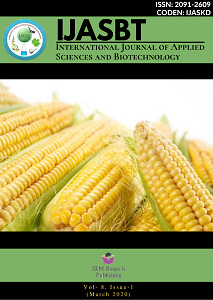Quality Deterioration of Commercial Bean (Phaseolus vulgaris) Seeds Stored under Contrasting Environmental Conditions in Sri Lanka
DOI:
https://doi.org/10.3126/ijasbt.v8i1.28253Keywords:
Field emergence, Germination, OJIP analysis, Storage condition, vigour indexAbstract
Bean is a popular vegetable grown in most parts of Sri Lanka. Farmers and home gardeners purchase seeds in packeted form retail outlets. However, quality problems are frequently reported, especially on low field germination. Quality parameters namely, percentage germination, field emergence, seedling length, vigour index and chlorophyll fluorescence analysis were used to determine the effect of different storage environmental conditions on seed longevity of two bean varieties during a two-year storage period, 2016 to 2018. Seeds in triple-laminated packets stored in four contrasting conditions; low temperature storage conditions (Tem. 5oC, 65% RH); three geo-environmental conditions namely, Gannoruwa (mid country wet zone), Kundasale (mid country intermediate zone), and Mahailuppallama (low country dry zone) showed varied behavior in seed quality parameters respective of the variety. It was apparent that germination test alone does not represent the full potential of field emergence. Results of the present study revealed that when field emergence and vigour are also taken in to account, both varieties of bean seeds can be stored under ambient conditions at Gannoruwa, Kundasale or MahaIlluppallama for a maximum period of 12 months, without compromising the seed quality. The seeds stored under low temperature conditions (i.e. 5 °C), maintained the seed germination over 75% for a period of 24 months.




